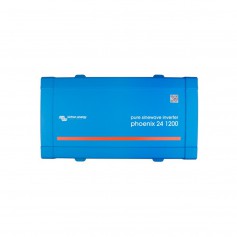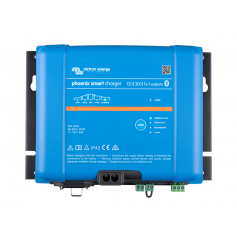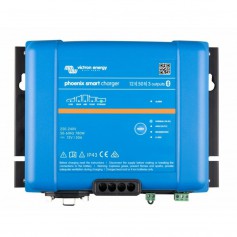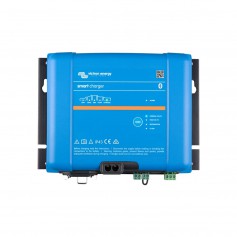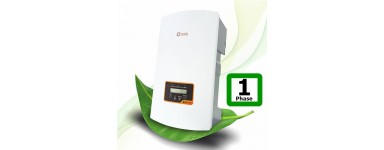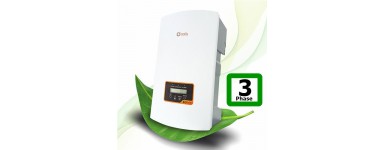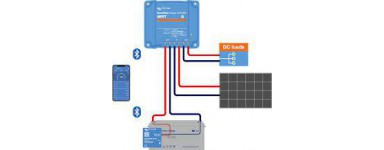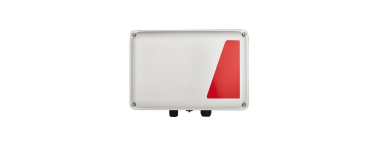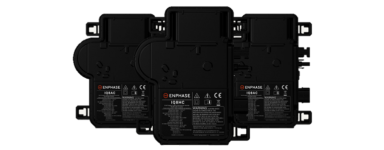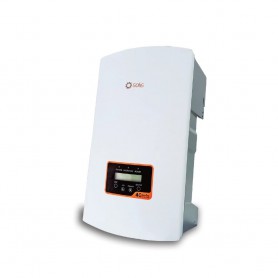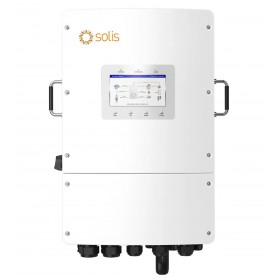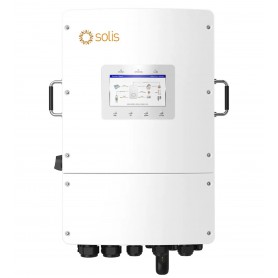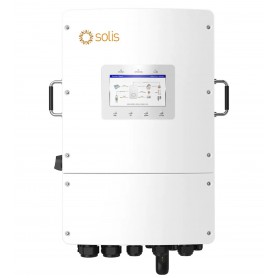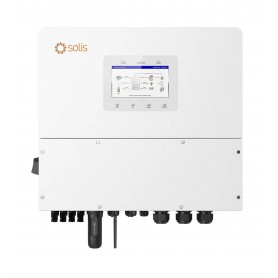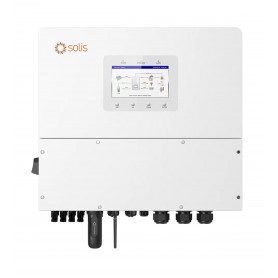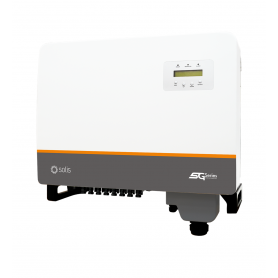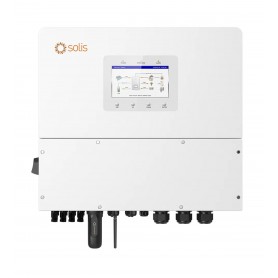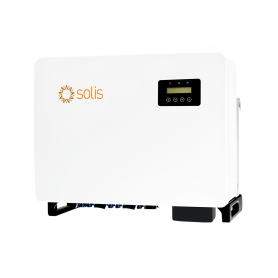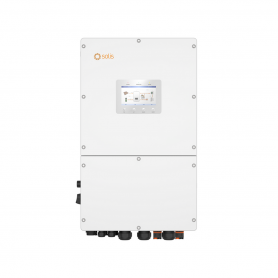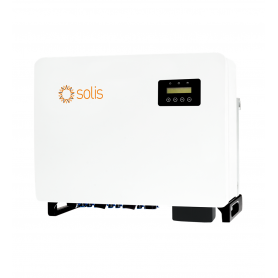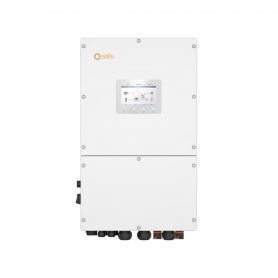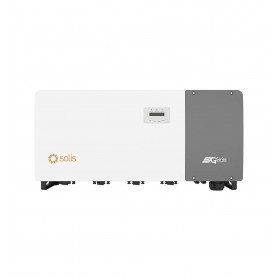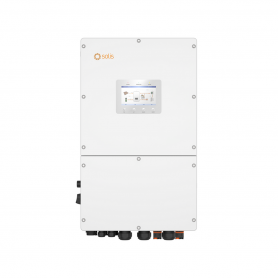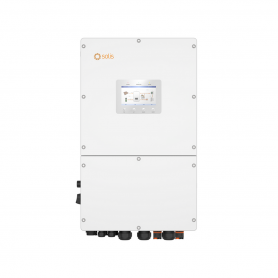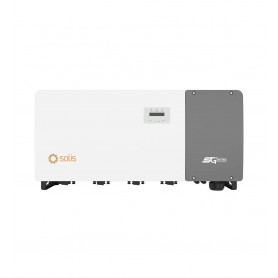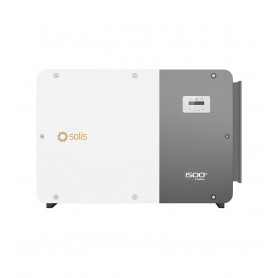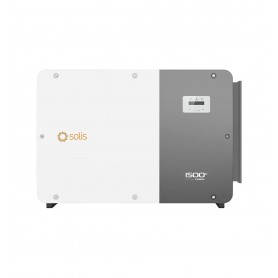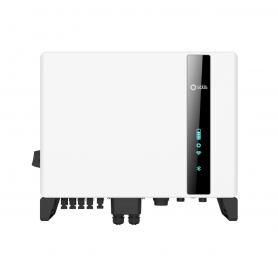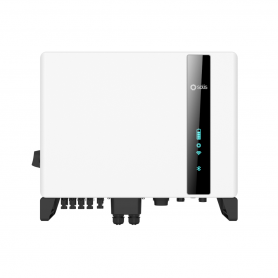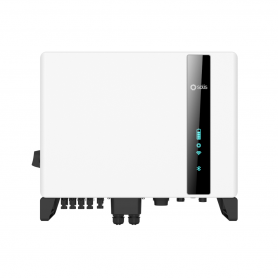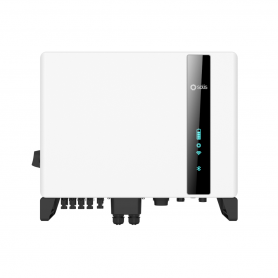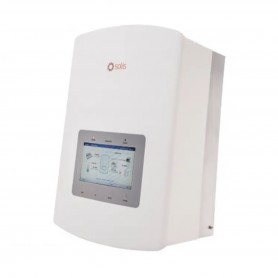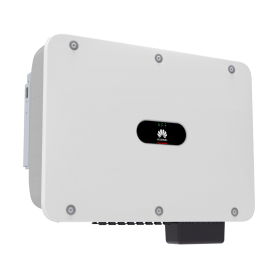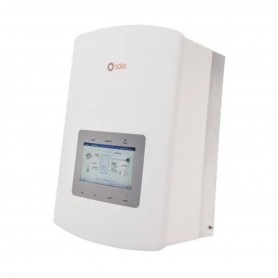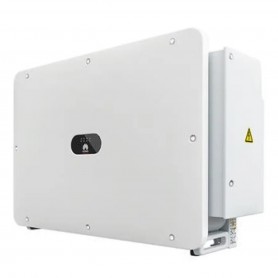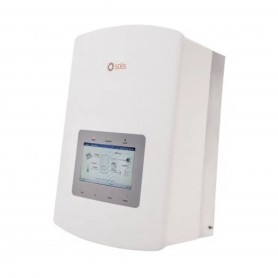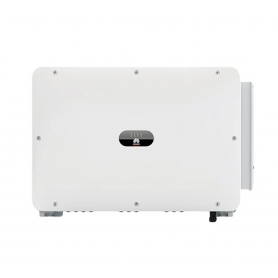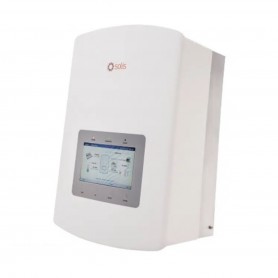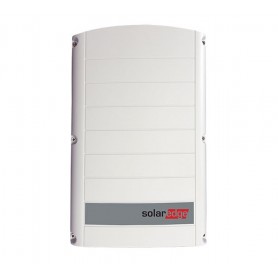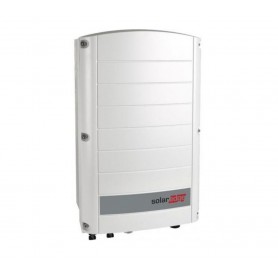Ningún producto
Filters
Solar InvertersThere are 216 products.

Un inversor solar es un dispositivo que convierte la corriente continua (CC) generada por los paneles solares en corriente alterna (CA) utilizada por los aparatos eléctricos en los hogares. Los inversores solares son esenciales para cualquier sistema de energía solar, ya que convierten la energía de los paneles solares en una forma que puede ser utilizada por electrodomésticos.
Hay dos tipos principales de inversores solares: inversores conectados a la red e inversores fuera de la red. Los inversores conectados a la red están conectados a la red y alimentan la energía generada por los paneles solares de vuelta a la red. Los inversores fuera de la red no están conectados a la red y alimentan la energía generada por los paneles solares con baterías.
Los inversores conectados a la red son el tipo más común de inversores solares. Son fáciles de instalar y mantener, y son relativamente asequibles. Los inversores fuera de la red son más caros que los inversores conectados a la red, pero ofrecen la ventaja de que también funcionan cuando falla la red eléctrica.
La elección de un inversor solar depende de una serie de factores, incluido el tamaño del sistema de energía solar, la ubicación del sistema y la necesidad de energía de respaldo. Si está considerando un sistema solar, es importante hablar con un instalador calificado para elegir el mejor inversor para sus necesidades.
Estos son algunos de los factores más importantes a considerar al elegir un inversor solar:
- Tamaño del sistema de energía solar: El tamaño del sistema de energía solar determina el tamaño del inversor que necesita. Un sistema de energía solar más pequeño necesita un inversor más pequeño que un sistema de energía solar más grande.
- Ubicación del sistema de energía solar: La ubicación del sistema de energía solar también puede afectar el tipo de inversor que necesita. Si su sistema solar está ubicado en un área con mucha sombra, es posible que necesite un inversor con una mayor eficiencia.
- Necesidad de energía de respaldo: Si necesita energía de respaldo, necesita un inversor diseñado para funcionar con una batería.
Si está considerando un sistema solar, es importante hablar con un instalador calificado para elegir el mejor inversor para sus necesidades.
Subcategorías
-
Inversores monofásicos
Los inversores monofásicos son el tipo más común de inversores solares. Están diseñados para funcionar con una red eléctrica monofásica, lo que significa que convierten solo una fase de corriente alterna (CA) en corriente continua (CC). Los inversores monofásicos son ideales para sistemas de energía solar más pequeños, como los de hogares o pequeñas empresas.
Los inversores monofásicos son relativamente asequibles y fáciles de instalar. También son muy eficientes, por lo que pierden poca energía durante el proceso de transformación. Los inversores monofásicos son una buena opción para las personas que buscan una forma asequible y eficiente de conectar su sistema de energía solar a la red eléctrica.
Estas son algunas de las ventajas de los inversores monofásicos:
- Asequible: Los inversores monofásicos son relativamente asequibles, lo que los convierte en una buena opción para aquellos con un presupuesto limitado.
- Eficiente: Los inversores monofásicos son muy eficientes, por lo que pierden poca energía durante el proceso de conversión.
- Fácil de instalar: Los inversores monofásicos son fáciles de instalar, lo que los convierte en una buena opción para las personas que desean instalar su sistema de energía solar ellos mismos.
Estas son algunas de las desventajas de los inversores monofásicos:
- Menos potencia: Los inversores monofásicos tienen una potencia menor que los inversores trifásicos, lo que los hace inadecuados para grandes sistemas de energía solar.
- Menos flexible: Los inversores monofásicos son menos flexibles que los inversores trifásicos porque solo se pueden usar con una red eléctrica monofásica.
Si está considerando un sistema de energía solar, es importante determinar si un inversor monofásico es adecuado para sus necesidades. Si tiene un pequeño sistema de energía solar y está buscando una solución asequible y eficiente, entonces un inversor monofásico es una buena opción. Sin embargo, si tiene un sistema solar grande o necesita una solución más flexible, es posible que deba considerar un inversor trifásico.
-
inversores trifásicos
Un inversor trifásico es un dispositivo que convierte la corriente continua (CC) en corriente alterna trifásica (CA). Los inversores trifásicos se utilizan a menudo en grandes sistemas de energía solar, como los de edificios comerciales o empresas industriales.
Los inversores trifásicos son más eficientes que los inversores monofásicos, por lo que pierden menos energía durante el proceso de conversión. Los inversores trifásicos también son más potentes que los inversores monofásicos, lo que los hace adecuados para sistemas de energía solar más grandes.
Estas son algunas de las ventajas de los inversores trifásicos:
- Mayor eficiencia: Los inversores trifásicos son más eficientes que los inversores monofásicos, por lo que pierden menos energía durante el proceso de conversión.
- Mayor potencia: Los inversores trifásicos son más potentes que los inversores monofásicos, lo que los hace adecuados para sistemas de energía solar más grandes.
- Más flexibilidad: Los inversores trifásicos son más flexibles que los inversores monofásicos porque se pueden utilizar con una amplia gama de sistemas de energía solar.
Estas son algunas de las desventajas de los inversores trifásicos:
- Más caro: Los inversores trifásicos son más caros que los inversores monofásicos.
- Más difícil de instalar: Los inversores trifásicos son más difíciles de instalar que los inversores monofásicos.
Si está considerando un sistema de energía solar, es importante determinar si un inversor trifásico es adecuado para sus necesidades. Si tiene un gran sistema de energía solar y está buscando una solución eficiente y potente, entonces un inversor trifásico es una buena opción.
-
Inversores Híbridos
Un inversor híbrido es un dispositivo que convierte la corriente continua (CC) generada por los paneles solares en corriente alterna (CA) utilizada por los aparatos eléctricos en los hogares. Los inversores híbridos también pueden almacenar electricidad de la red en una batería y usar esa energía almacenada cuando los paneles solares no generan suficiente energía.
Los inversores híbridos son una buena opción para las personas que buscan una manera de integrar su sistema de energía solar con su red eléctrica existente. Los inversores híbridos pueden ayudar a reducir su factura de electricidad y también pueden proporcionar energía de respaldo en caso de un corte de energía.
Estas son algunas de las ventajas de los inversores híbridos:
- Ahorros en su factura de electricidad: Los inversores híbridos pueden ayudarlo a reducir su factura de electricidad al devolver la energía generada por sus paneles solares a la red.
- Energía de respaldo: Los inversores híbridos pueden proporcionar energía de respaldo en caso de un corte de energía utilizando la energía almacenada en la batería.
- Flexibilidad: Los inversores híbridos son más flexibles que los inversores tradicionales porque se pueden utilizar con una amplia gama de sistemas de energía solar.
Estas son algunas de las desventajas de los inversores híbridos:
- Más caro: Los inversores híbridos son más caros que los inversores tradicionales.
- Más difícil de instalar: Los inversores híbridos son más difíciles de instalar que los inversores tradicionales.
Si está considerando un sistema solar, es importante determinar si un inversor híbrido es adecuado para sus necesidades. Si está buscando una manera de integrar su sistema solar con su red existente y desea ahorrar en su factura de electricidad y proteger su hogar de cortes de energía, un inversor híbrido es una buena opción.
-
Comunicación y vigilancia
Las comunicaciones y el monitoreo de energía solar son sistemas utilizados para monitorear y controlar los sistemas de energía solar. Estos sistemas se pueden utilizar para monitorear el rendimiento del sistema de energía solar, detectar cualquier problema y controlar el sistema de forma remota.
Hay diferentes tipos de comunicaciones solares y sistemas de monitoreo disponibles, cada uno con sus propias características únicas. Los tipos más comunes de sistemas son:
- Sistema de monitoreo local: Este tipo de sistema utiliza un monitor local para rastrear el rendimiento del sistema de energía solar. El monitor generalmente se instala cerca del sistema de energía solar y se puede usar para ver datos sobre el rendimiento del sistema, como la cantidad de energía generada, la temperatura de los paneles solares y el estado del inversor.
- Sistema de monitoreo remoto: Este tipo de sistema utiliza una conexión a Internet para monitorear el rendimiento del sistema de energía solar. El sistema se puede controlar desde cualquier lugar con acceso a Internet y se puede utilizar para ver datos sobre el rendimiento del sistema, como la cantidad de energía generada, la temperatura de los paneles solares, el estado del inversor y cualquier problema con el sistema.
- Sistema de monitoreo combinado: Este tipo de sistema combina las funciones de un sistema de monitoreo local y un sistema de monitoreo remoto. El sistema se puede utilizar para ver datos sobre el rendimiento del sistema, como la cantidad de energía generada, la temperatura de los paneles solares, el estado del inversor y cualquier problema con el sistema.
Los sistemas de comunicación y monitoreo solar se pueden utilizar para mejorar el rendimiento de su sistema de energía solar, detectar cualquier problema y controlar el sistema de forma remota. Si está considerando un sistema solar, es importante elegir uno que se adapte a sus necesidades.
-
Solar Interface

Un optimizador solar es un dispositivo utilizado en un sistema de energía solar para mejorar la eficiencia de los paneles solares. Los optimizadores se colocan entre los paneles solares y el inversor, y aseguran que cada panel solar funcione a su máxima potencia, independientemente de la sombra u otros factores que puedan afectar el rendimiento de un panel solar.
Los optimizadores pueden mejorar el rendimiento de un sistema de energía solar en un 10-20%. También pueden extender la vida útil de los paneles solares regulando la temperatura y estabilizando el voltaje.
Los optimizadores son una buena opción para los propietarios de sistemas solares que desean aprovechar al máximo su inversión. También pueden ser una buena opción para los propietarios de sistemas solares que están lidiando con la sombra u otros factores que pueden afectar el rendimiento de sus paneles solares.
Estos son algunos de los beneficios de usar optimizadores solares:
- Mayor eficiencia: los optimizadores pueden mejorar el rendimiento de un sistema de energía solar en un 10-20%.
- Rendimiento optimizado: Los optimizadores aseguran que cada panel solar funcione a su máxima potencia, independientemente de la sombra u otros factores que puedan afectar el rendimiento de un panel solar.
- Vida útil prolongada: los optimizadores pueden extender la vida útil de los paneles solares regulando la temperatura y estabilizando el voltaje.
- Monitoreo mejorado: Los optimizadores ofrecen capacidades de monitoreo integrales, lo que permite a los propietarios de sistemas solares rastrear el rendimiento de su sistema e identificar cualquier problema.
Si está considerando instalar un sistema de energía solar, es recomendable considerar el uso de optimizadores. Los optimizadores pueden ayudarlo a aprovechar al máximo su inversión y mantener su sistema solar funcionando al máximo.
-
Optimizers
-
Microinversores
Los microinversores solares son pequeños dispositivos electrónicos que convierten la electricidad de corriente continua (CC) producida por los paneles solares individuales en electricidad de corriente alterna (CA). Esta electricidad de CA se puede usar para alimentar su hogar o negocio, o venderse a la red.
Los microinversores solares son una tecnología relativamente nueva, pero se han vuelto cada vez más populares en los últimos años. Esto se debe a varias ventajas que ofrecen sobre los inversores string tradicionales.
Ventajas de los microinversores solares:
- Aumento de la producción de energía: Los microinversores solares pueden maximizar la producción de energía convirtiendo la electricidad de CC de cada panel solar de forma independiente. Esto significa que el rendimiento general del sistema solar no se ve afectado por el panel más débil.
- Rendimiento de sombreado mejorado: Los microinversores solares pueden funcionar eficazmente en condiciones de sombra. Esto se debe a que pueden convertir la electricidad de CC de cada panel de forma independiente, incluso si algunos de los paneles están sombreados.
- Mayor seguridad: Los microinversores solares funcionan a baja tensión, lo que los hace más seguros que los inversores de cadena tradicionales. Esto se debe a que hay menos riesgo de descarga eléctrica si hay una falla en el sistema.
- Instalación más fácil: Los microinversores solares suelen ser más fáciles de instalar que los inversores de cadena tradicionales. Esto se debe a que son más pequeños y livianos, y se pueden montar directamente en los paneles solares.
Desventajas de los microinversores solares:
- Mayor costo: Los microinversores solares son más caros que los inversores de cadena tradicionales. Esto se debe a que son más complejos de fabricar e instalar.
- Más componentes: Los microinversores solares requieren más componentes que los inversores de cadena tradicionales. Esto puede hacer que el sistema sea más complicado y más propenso a fallar.
En general, los microinversores solares son una tecnología prometedora que puede ofrecer varias ventajas sobre los inversores de cadena tradicionales. Sin embargo, también son más caros y complejos.
Estos son algunos de los principales fabricantes de microinversores solares:
- Energía de enfase
- Tecnologías SolarEdge
- SMA Solar Technology AG
- Hoymiles Power Electronics Inc.
- Chilicon Power Electronics Corp
-
 NuevoEn stock = 1x
NuevoEn stock = 1x -
 NuevoEn stock = 1x
NuevoEn stock = 1x -
 Nuevo¡Hacer un pedido! Sea el primero en la fila para recibir este producto. Cuando el artículo esté en stock, serviremos primero los pedidos ya realizados.
Nuevo¡Hacer un pedido! Sea el primero en la fila para recibir este producto. Cuando el artículo esté en stock, serviremos primero los pedidos ya realizados. -
-
Solis 5kW S5 Serie 3-Phase 2MPPT - DC SOL-S5-GR3P-5K-DC
¡Hacer un pedido! Sea el primero en la fila para recibir este producto. Cuando el artículo esté en stock, serviremos primero los pedidos ya realizados.¡Precio reducido! -
-
-
-
-
 ¡Rebaja!En stock = 1x
¡Rebaja!En stock = 1x -
-
 ¡Rebaja!¡Hacer un pedido! Sea el primero en la fila para recibir este producto. Cuando el artículo esté en stock, serviremos primero los pedidos ya realizados.
¡Rebaja!¡Hacer un pedido! Sea el primero en la fila para recibir este producto. Cuando el artículo esté en stock, serviremos primero los pedidos ya realizados. -
 ¡Rebaja!En stock = 13x
¡Rebaja!En stock = 13x -
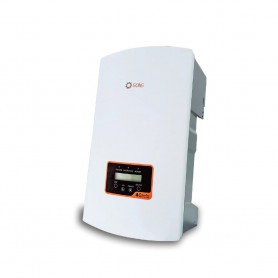 ¡Rebaja!¡Hacer un pedido! Sea el primero en la fila para recibir este producto. Cuando el artículo esté en stock, serviremos primero los pedidos ya realizados.
¡Rebaja!¡Hacer un pedido! Sea el primero en la fila para recibir este producto. Cuando el artículo esté en stock, serviremos primero los pedidos ya realizados. -
-
-
-
-
-
-
-
-
-
-
Inversor Solís 5G PRO 80kW Trifásico
¡Hacer un pedido! Sea el primero en la fila para recibir este producto. Cuando el artículo esté en stock, serviremos primero los pedidos ya realizados. -
-
-
-
Solis 12kW S6-EH3P12K-ND-H-EU Hybrid inverter, 3-Fase, 4 MPPT, High Voltage, Wifi monitoring dongle and CT's included
¡Hacer un pedido! Sea el primero en la fila para recibir este producto. Cuando el artículo esté en stock, serviremos primero los pedidos ya realizados. -
Inversor trifásico Solis 255 kW con conexión a red
¡Hacer un pedido! Sea el primero en la fila para recibir este producto. Cuando el artículo esté en stock, serviremos primero los pedidos ya realizados. -
 ¡Rebaja!En stock = 7x
¡Rebaja!En stock = 7x -
-
-
-
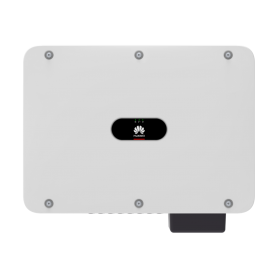 ¡Rebaja!En stock = 1x
¡Rebaja!En stock = 1x -
-
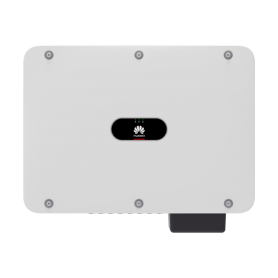 ¡Rebaja!¡Hacer un pedido! Sea el primero en la fila para recibir este producto. Cuando el artículo esté en stock, serviremos primero los pedidos ya realizados.
¡Rebaja!¡Hacer un pedido! Sea el primero en la fila para recibir este producto. Cuando el artículo esté en stock, serviremos primero los pedidos ya realizados. -
Solis 5G 5,0 kW 230V, LV Inversor híbrido monofásico con AC
¡Hacer un pedido! Sea el primero en la fila para recibir este producto. Cuando el artículo esté en stock, serviremos primero los pedidos ya realizados. -
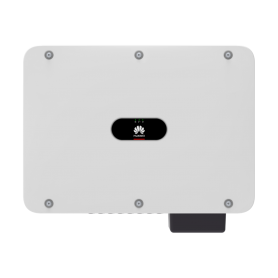 ¡Rebaja!En stock = 5x
¡Rebaja!En stock = 5x -
-
-
-
Inversor trifásico Huawei SUN2000 115KTL M2 de 115 kW
¡Hacer un pedido! Sea el primero en la fila para recibir este producto. Cuando el artículo esté en stock, serviremos primero los pedidos ya realizados. -
-
-
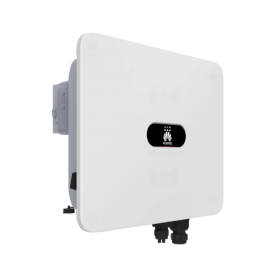 ¡Rebaja!¡Hacer un pedido! Sea el primero en la fila para recibir este producto. Cuando el artículo esté en stock, serviremos primero los pedidos ya realizados.
¡Rebaja!¡Hacer un pedido! Sea el primero en la fila para recibir este producto. Cuando el artículo esté en stock, serviremos primero los pedidos ya realizados. -
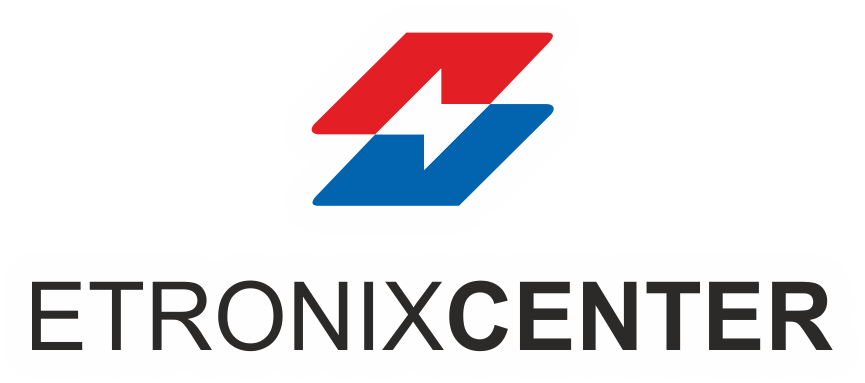
 es
es
 de
de  en
en  fr
fr  it
it  nl
nl  ro
ro 



























 (PAÍS_NOMBRE).
(PAÍS_NOMBRE).

